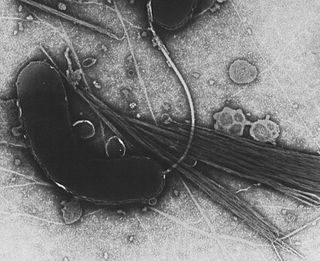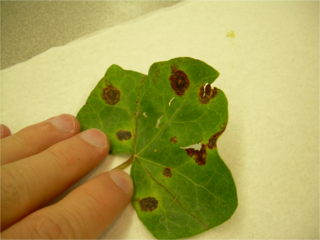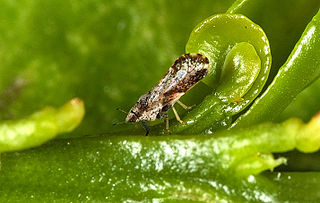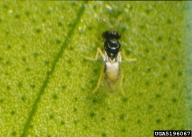
Psyllidae, the jumping plant lice or psyllids, are a family of small plant-feeding insects that tend to be very host-specific, i.e. each plant-louse species only feeds on one plant species (monophagous) or feeds on a few closely related plants (oligophagous). Together with aphids, phylloxerans, scale insects and whiteflies, they form the group called Sternorrhyncha, which is considered to be the most "primitive" group within the true bugs (Hemiptera). They have traditionally been considered a single family, Psyllidae, but recent classifications divide the group into a total of seven families; the present restricted definition still includes more than 70 genera in the Psyllidae. Psyllid fossils have been found from the early Permian before the flowering plants evolved. The explosive diversification of the flowering plants in the Cretaceous was paralleled by a massive diversification of associated insects, and many of the morphological and metabolic characters that the flowering plants exhibit may have evolved as defenses against herbivorous insects.

Citrus canker is a disease affecting Citrus species caused by the bacterium Xanthomonas axonopodis. Infection causes lesions on the leaves, stems, and fruit of citrus trees, including lime, oranges, and grapefruit. While not harmful to humans, canker significantly affects the vitality of citrus trees, causing leaves and fruit to drop prematurely; a fruit infected with canker is safe to eat, but too unsightly to be sold.

Gammaproteobacteria are a class of bacteria. Several medically, ecologically, and scientifically important groups of bacteria belong to this class, as do a number of important pathogens. Like all Proteobacteria, the Gammaproteobacteria are Gram-negative.

Xanthomonas campestris is bacterial species that causes a variety of plant diseases, including "black rot" in cruciferous vegetables and bacterial wilt of turfgrass.
The beet leafhopper, also sometimes known as Neoaliturus tenellus, is a species of leafhopper which belongs to the family Cicadellidae in the order Hemiptera.
Xanthomonas citri is a Gram-negative, rod-shaped proteobacteria. Although it is harmless for humans, it is a phytopathogen, known for being the causing agent of citrus canker.
Capnodium citri can refer to the following sooty molds:
Alternaria citri is a fungal plant pathogen.

Diaporthales is an order of sac fungi.

The Center for Information Technology Research in the Interest of Society (CITRIS) is an institute operated by the State of California to facilitate the real-world application of technological research. Approved in 2000, it is part of the Governor Gray Davis Institutes for Science and Innovation, along with the California Institute for Quantitative Biosciences, California Institute for Telecommunications and Information Technology, and the California Nanosystems Institute. Headquartered at UC Berkeley, CITRIS was founded in 2001 from a desire to see innovative technologies put to practical use in improving quality of life for people. In the organization's own words, "CITRIS was created to 'shorten the pipeline' between world-class laboratory research and the creation of start-ups, larger companies, and whole industries", a mission it seeks to achieve through partnering academicians at UC Santa Cruz, UC Merced, UC Davis, and UC Berkeley with industrial researchers.

The Asian citrus psyllid, Diaphorina citri, is a sap-sucking, hemipteran bug in the family Psyllidae. It is an important pest of citrus, as it is one of only two confirmed vectors of the serious citrus greening disease. It is widely distributed in southern Asia and has spread to other citrus growing regions.

Clara Henriette Hasse was an American botanist whose research focused on plant pathology. She is known for identifying the cause of citrus canker, which was threatening crops in the Deep South.

Planococcus citri, commonly known as the citrus mealybug, is a species of mealybugs native to Asia. It has been introduced to the rest of the world, including Europe, the Americas, and Oceania, as an agricultural pest. It is associated with citrus, but it attacks a wide range of crop plants, ornamental plants, and wild flora.
The Citrus stubborn disease is a plant disease affecting species in the genus Citrus. Spiroplasma citri, a Mollicute bacterium species, is the causative agent of the disease. It is present in the phloem of the affected plant and transmitted by several leafhoppers including Circulifer tenellus and Scaphytopius nitridus in citrus-growing regions of California and Arizona and Circulifer haematoceps in the Mediterranean region.

Cyantraniliprole is an insecticide of the ryanoid class. It is approved for use in the United States, Canada, China, and India. Because of its uncommon mechanism of action as a ryanoid, it has activity against pests such as Diaphorina citri that have developed resistance to other classes insecticides. Cyantraniliprole is highly toxic to bees, which resulted in registration of its use as a pesticide being delayed in the USA.

Spiroplasma phage 1-R8A2B is a filamentous bacteriophage in the genus Plectrovirus of the family Inoviridae, part of the group of single-stranded DNA viruses. The virus has many synonyms, such as SpV1-R8A2 B, Spiroplasma phage 1, and Spiroplasma virus 1, SpV1. SpV1-R8A2 B infects Spiroplasma citri. Its host itself is a prokaryotic pathogen for citrus plants, causing Citrus stubborn disease.

Tamarixia radiata, the Asian citrus cyllid parasitoid, is an hymenopteran wasp from the family Eulophidae which was discovered in the 1920s in the area of northwestern India (Punjab), now Pakistan. It is a parasitoid of the Asian citrus psyllid, an economically important pest of citrus crops around the world and a vector for Citrus greening disease.











